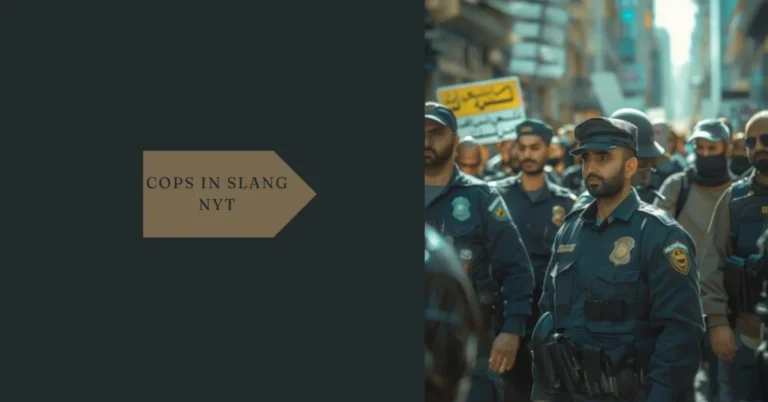Introduction to NYT Crossword and
The New York Times Crossword is a treasure trove of wordplay, wit, and cultural references. Each puzzle challenges us to think outside the box while providing a glimpse into society’s evolving language. One intriguing aspect that often pops up is the use of slang terms employed by police officers—terms that can stump even seasoned solvers. If you’ve ever come across clues related to “cops in slang” in the NYT crossword, you know they not only test your vocabulary but also open a window into an entire subculture. Let’s dive deep into the world of police slang and explore how these unique expressions have found their way into crossword puzzles over time!
History of slang terms used by police officers
Slang has always been a vibrant part of law enforcement culture. From the early days of policing, officers have developed a unique lexicon to communicate efficiently and build camaraderie.
In the 19th century, terms like “copper” emerged as a reference to police officers in London, derived from their copper badges. This set the stage for an evolving vocabulary that reflected both humor and seriousness.
As cities grew and crime evolved, so did the language of cops. Words like “badge” became synonymous with authority while others like “squealer” referred to informants or snitches.
The use of slang often served practical purposes—making conversations more discreet among officers or even creating an insider identity within communities. Each term encapsulated specific experiences on the job, revealing how deeply intertwined language is with policing practices throughout history.
Commonly used
Slang terms used by police officers create a colorful tapestry of language. These expressions often reflect the realities and camaraderie of life on the beat.
One common term is “cop,” itself derived from “copper.” This has evolved over decades, yet remains instantly recognizable.
Another frequently encountered phrase is “the fuzz,” which carries a playful tone while hinting at authority. It’s surprising how many people recognize it, even outside law enforcement circles.
Then there’s “badge,” representing not just an officer’s identification but also their commitment to service. Each term tells a story beyond its definition.
These words don’t just populate conversations; they slip into popular culture too. You might find them in movies or TV shows portraying police life, reinforcing their familiarity with broader audiences.
Examples of these terms appearing in past NYT crosswords
New York Times Crosswords have a fascinating way of weaving in cultural references. Slang terms related to police officers pop up regularly, reflecting our society’s evolving language.
For instance, “blue” often refers to the police. This term has appeared numerous times, capturing the essence of law enforcement’s color-coded identity.
Another example is “cop” itself. Simple yet effective, this word finds its place in various clues and answers across puzzles.
Then there’s “badge,” which can signify authority and power within these word games. It adds depth to crossword themes involving crime or justice.
Such usage not only entertains but also educates solvers about colloquial expressions tied to policing culture. Each time one encounters these terms in a puzzle, it’s like unlocking a piece of urban history that shapes today’s dialogue around law enforcement.
Tips for solving clues related to
When tackling clues related to “cops in slang” in the NYT Crossword, context is key. Think about recent news or pop culture references that might inform your understanding.
Familiarize yourself with common slang terms used by police officers. Phrases like “the fuzz” or “5-0” frequently appear and are often interchangeable.
Don’t hesitate to consider both the letters you already have and possible synonyms for the clue. It can help expand your thinking when it comes to finding solutions.
If you’re stuck, take a breather. Sometimes stepping away allows fresh ideas to surface upon returning with a clear mind.
Engage with fellow crossword enthusiasts online. They may offer insights on tricky clues that could otherwise trip you up while adding some fun camaraderie to your solving experience.
Controversy surrounding the use of these terms in puzzles
The use of slang terms related to cops in crossword puzzles has sparked debate among enthusiasts and critics alike. Some argue that these terms can perpetuate stereotypes or reinforce negative perceptions of law enforcement.
On one hand, advocates for using such language highlight its cultural relevance. Slang reflects the dynamic nature of communication within communities, especially in urban settings. It captures a specific zeitgeist and adds flavor to the clues.
Critics point out that certain phrases may be outdated or insensitive. They call for a more thoughtful approach to language selection in crosswords. The challenge lies in balancing authenticity with awareness.
As discussions continue, it’s clear that the evolution of slang will keep intersecting with puzzle-making practices, prompting both reflection and dialogue about representation in this beloved pastime.
Conclusion: The evolution of language and its reflection in crossword puzzles
The evolution of language is a fascinating journey, one that captures the essence of cultural shifts and social dynamics. Crossword puzzles like those in the New York Times stand as a mirror reflecting this change, especially when it comes to slang used by police officers.
As society evolves, so do the terms we use. Slang can provide insight into not only communication styles but also societal attitudes toward authority and law enforcement. The presence of “cops in slang” within crossword clues illustrates how these terms enter public consciousness and become part of our collective lexicon.
Moreover, incorporating such phrases into puzzles adds layers to both language and culture. It encourages solvers to explore new meanings while prompting discussions around their usage—both positive and negative. This interplay between words on paper and real-world implications showcases how dynamic language truly is.
Crossword enthusiasts often find themselves navigating through nuances tied to specific eras or communities reflected in these clues. What remains clear is that as language continues to shift, so too will its representation in popular media like crosswords—keeping them relevant for generations to come.
FAQs
Q: What does “Cops in Slang” mean in the NYT Crossword?
Ans: In the NYT Crossword, “Cops in Slang” typically refers to a colloquial term used to describe police officers, often in a shortened or informal way.
Q: Why is “Cops in Slang” a common crossword clue?
Ans: “Cops in Slang” is common because it plays on popular slang terms, adding a layer of challenge and cultural reference for solvers.
Q: What are some examples of slang for cops?
Ans: Some common slang terms for cops include “fuzz,” “the heat,” “the boys in blue,” and “the po-po.”
Q: How can I solve crossword clues like “Cops in Slang”?
Ans: To solve such clues, think of popular slang terms for police and consider the number of letters required by the puzzle.
Q: Is “Cops in Slang” unique to NYT Crosswords?
Ans: While it’s a popular clue in NYT Crosswords, variations of “Cops in Slang” can appear in other crossword puzzles as well.

